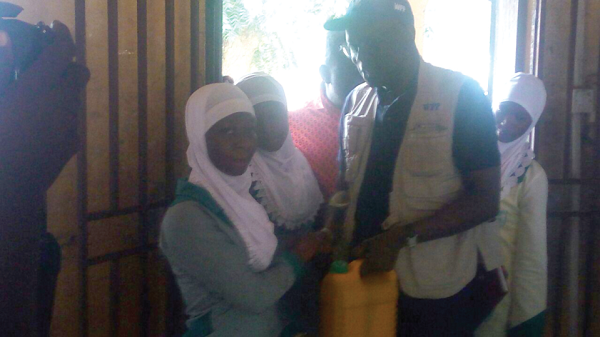
Nutrition project to cover women & children in northern regions
The World Food Programme (WFP) is to scale up its nutrition-sensitive project to reduce stunting and micronutrient deficiencies to cover the three northern regions.
The scaling up is after a successful pilot in the Central Gonja District and the Bolgatanga Municipality in the Northern and Upper East regions December, 2017.
Advertisement
The project titled “Local Food Based-Approaches to Improved Nutrition” (LoFAIN), when upscaled, is targeted to improve the nutritional status of about 20,000 children and 20,000 women in northern Ghana and it is being funded by the Government of Japan.
The project
The goals of the project is to improve dietary intake and contribute to stunting reduction, improved infant and young child nutrition through an e-voucher system and enhance the nutritional value of home-grown school feeding programme.
It is also aimed at supporting Ghana to achieve the Sustainable Development Goal 2 (SDG 2) focused on ending hunger, achieving food security and improved nutrition and promoting sustainable agriculture.
Statistics
Although Ghana has made strides in improving nutrition at the national level, in northern Ghana, there is still a high level of stunting with associated micronutrient deficiencies. Although the prevalence of stunting among children in Ghana is 18.8 per cent, this figure rises as high as 33 per cent (one in three children) in the Northern Region.
It is therefore against this backdrop that the WFP is implementing the LoFAIN project to reduce stunting and micronutrient deficiencies in the three regions of the north.
Visit
This came to light when the WFP’s Regional Director for West and Central Africa, Mr Abdou Dieng, paid a visit to two WFP project sites in Yapei in the Central Gonja District and the Nahdah Islamic Junior High School (JHS) in Tamale respectively last Tuesday, to apprise himself of WFP’s stunting prevention programme for children dubbed LoFAIN and an education-supported programme titled: “Breaking Barriers To Gender Equality.”
The WFP’s Regional Director for West and Central Africa was accompanied on the visit by Ghana’s WFP Country Representative, Ms Rukia Yacoub.
Girl’s education
The ‘Breaking Barriers to Gender Equality’ project initiated by WFP in collaboration with the Government of Ghana is currently being implemented in 408 JHSs in the Northern, Upper West and Volta regions in which 30,000 girls have been registered onto the programme. The Northern Region has the highest number of schools with 276 schools.
The programme is to retain and encourage regular school attendance among girls in JHS. Each girl under the programme who attends school for 80 per cent of a term is entitled to a ration of 12 kilogrammes (Kg) of beans, 6kg litres of vegetable oil and 3kg of iodised salt.
The programme has transitioned from in-kind food assistance to the use of electronic voucher (E-voucher) and under the model; WFP has contracted local businesses to supply food to the girls, instead of the previous model in which the government was in charge of transporting food purchased by WFP to the regions, districts and schools.
Another innovation in the programme is the inclusion of nutrition education and adolescent, sexual and reproductive health messages to influence adolescents’ eating habits and prepare them for a healthy motherhood.
Support
Speaking in an interview with newsmen after the visit, Mr Dieng expressed his satisfaction for the progress made so far under the project, saying it would go a long way to increase enrolment and retention of girls in school to enable them to achieve their long life dreams.
He gave an assurance that WFP would continue to support the government of Ghana to achieve SDG 2 which is on zero hunger through various nutrition, food security and education interventions.